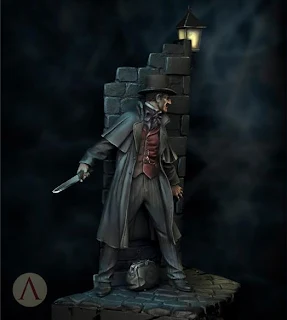The people at Scale
75 put out regularly some great figures – and this month is no different -
From the Roman Praetorian guard soldier to two (make that three) literary characters
in Dr. Jekyll and Mr. Hyde as well as
Jack the ripper sculpts are up for your viewing, I can see the fog
rolling in off your workbench right now….
Sculptor: JOAQUIN PALACIOS Painter: ALEX VARELA (IGUAZU) Ref: SCN-003
Jack the Ripper (Jack the Ripper in English) is the best
known of the pseudonyms that were given to an unidentified serial murderer who
committed various crimes in 1888, mainly in the district of Whitechapel in
London and in areas impoverished surroundings.
The aforementioned nickname originated from a letter written by someone who was adjudged the murders under his pseudonym and as a result of its dissemination by the media, the name became known to the general public. However, several sources believe that the aforementioned document was treated really a bad joke made by a journalist, in an attempt to increase interest in history and at the same time may make a fuss.
The aforementioned nickname originated from a letter written by someone who was adjudged the murders under his pseudonym and as a result of its dissemination by the media, the name became known to the general public. However, several sources believe that the aforementioned document was treated really a bad joke made by a journalist, in an attempt to increase interest in history and at the same time may make a fuss.
Often, Jack the Ripper murderer is described as a smart,
efficient, mocking, beating, cold and haunted by the murder. Attacks attributed
to him involving prostitutes in poor neighbourhoods and had a distinctive modus
operandi, which consisted of strangulation, beheading and mutilating abdominal
Because the murders were never solved, the legends surrounding them became a
combination of genuine historical research, folklore, and pseudo. Since then it
has recorded more than a hundred theories about the Ripper's identity, as
events have influenced many literary fiction, film and art.
Praetorian Guard were the household troops of the Roman
emperors. The cohors praetoria
existed by the 2nd century BC, acting as bodyguards for Roman generals. In 27BC
the emperor Augustus created a permanent corps of nine cohorts, stationing them
around Rome; in 2BC he appointed two equestrian prefects to command them, but
in ad 23 Tiberius’ powerful prefect Sejanus became their sole commander. He
concentrated them in fortified barracks outside the walls of Rome, gaining
significant political influence for them.
Subsequently, they generally participated in appointing
emperors and were responsible for the accession of Claudius (41); the disorders
of 68–69; the lynching of Domitian’s murderers (97); and the murders of
Pertinax (193), Elagabalus (222), and Balbinus and Maximus (238). Septimius
Severus reorganized the guard in 193, recruiting its members from the legions.
Constantine I disbanded them in 312. There are two different versions on offer here..
The Strange Case of Dr. Jekyll and Mr. Hyde (English Strange
Case of Dr Jekyll and Mr Hyde), sometimes simply called Dr. Jekyll and Mr.
Hyde, is a novel by Robert Louis Stevenson and first published in English in
1886, which is about a lawyer, Gabriel John Utterson, who investigates the
strange link between his old friend, Dr. Henry Jekyll, and the misanthropic
Edward Hyde.
The book is known to be a vivid representation of
psychopathology that causes a person to have two completely opposite
personalities. It refers to dissociative identity disorder, formerly known as
multiple personality disorder. It was an immediate success and one of the best
sellers of Stevenson. Stage adaptations began in Boston and London a year after
its publication and still continue to inspire films and interesting
interpretations.
We think the caption here would be "Aaaaaarrrrrrrrhhhhhhgggggghhhhhhhh"
Check out their
excellent site for more great figure in the Scale 75 range.. And please don't
ask what scale these are in! :-)

























